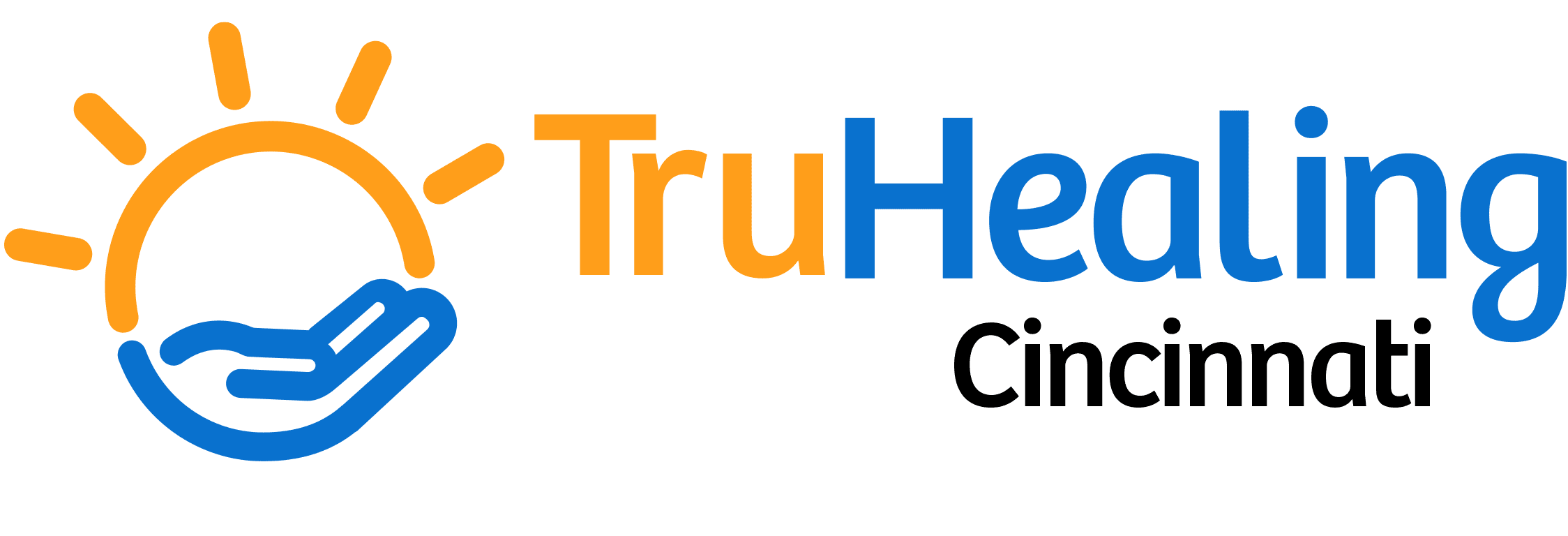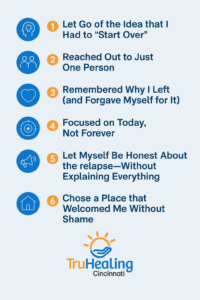I never meant to disappear.
I told myself I’d just skip one group. Then one more. I was “busy.” I was tired. I had reasons. And then I used again—just once, I told myself. But once didn’t stay once.
Soon I wasn’t just avoiding calls from my IOP counselor—I was avoiding my own reflection. I didn’t want to face what I’d “ruined.”
If that’s where you are now—somewhere between slipping and spiraling—I want you to hear this:
You can come back. Even now. Especially now.
Here’s what helped me return to drug addiction treatment in Cincinnati, even after relapse, even after ghosting, even after convincing myself I didn’t deserve another shot.
1. I Let Go of the Idea That I Had to “Start Over”
Relapse has a way of making you feel like you’re back at square one. Like none of the work you did before counts. But that’s a lie.
Everything you learned before is still there. The growth, the effort, the things you started to believe—they didn’t disappear. They just got buried under shame.
When I came back, I didn’t start from scratch. I started from experience. And that made a huge difference.
2. I Reached Out to Just One Person
When I realized I wanted help again, I didn’t blast a text to everyone I’d ghosted. I just messaged one person from group. I said, “I messed up. I want to come back. I don’t know where to start.”
They didn’t guilt me. They didn’t give me advice. They just said, “You’re not the only one.”
That cracked the door open for me. If you’re thinking about returning to treatment, start small. One text. One call. One honest sentence.
3. I Remembered Why I Left (and Forgave Myself for It)
Leaving treatment doesn’t always mean you stopped caring. Sometimes it means it got too hard. Or life pulled you in a hundred directions. Or you hit an emotional wall you didn’t know how to scale.
That was true for me. I hit a grief point I wasn’t ready to face. So I ran.
Coming back meant looking at that choice—not to justify it, but to understand it. And once I did, I could meet myself with compassion, not criticism.
4. I Focused on Today, Not Forever
One of the hardest parts of re-entering drug addiction treatment is imagining the future.
“How long will this take?”
“Will I relapse again?”
“Am I just going to be in and out forever?”
I had to stop time-traveling. The only thing I needed to focus on was this day. This hour. This breath.
That’s something my clinician said to me early on: “You don’t have to decide your whole future right now. Just decide not to suffer alone today.”
That was enough.
5. I Let Myself Be Honest About the Relapse—Without Explaining Everything
When I walked back into group, I didn’t give a TED Talk. I didn’t try to wrap my relapse in a bow or make it sound more meaningful than it was.
I just said, “I’m back. It got bad again. I don’t want to stay stuck.”
And people nodded. No one needed the play-by-play. I didn’t have to prove I was worthy of rejoining. I just had to show up.
6. I Chose a Place That Welcomed Me Without Shame
I can’t overstate how much it mattered to land in a space where relapse wasn’t treated like failure.
At TruHealing Cincinnati, I wasn’t asked, “Why did you leave?” I was asked, “What do you need now?”
That shift—from shame to support—is why I stayed.
If you’re near Lexington, Kentucky or Springfield, Ohio, TruHealing offers programs with that same approach. They don’t just reopen the door—they hold it open.
FAQ: Coming Back After Relapse or Ghosting
Is relapse common in recovery?
Yes. It doesn’t mean treatment “didn’t work.” It means something wasn’t finished yet—or life threw more at you than you were ready for. It’s a signal, not a failure.
Will I be judged for leaving?
No. At TruHealing, our staff understands that recovery isn’t a straight line. Many of them have lived experience. You’ll be met with openness, not blame.
Do I have to explain why I left?
Not unless you want to. You can talk about it in group or therapy, but you don’t have to offer a formal explanation. Just being back is a powerful statement.
What if I’m using again—can I still come back?
Yes. You’ll receive support for wherever you are. That may include detox, a new treatment plan, or transitioning to a different level of care. You’re never too far gone to begin again.
How fast can I return to treatment?
Often within days. Reach out and let the admissions team know your history with the program. We’ll help you restart quickly and safely.
You’re Not the Exception. You’re the Evidence.
The fact that you’re still reading this tells me something: the part of you that wants healing is still alive.
You haven’t ruined anything. You’ve just hit another chapter. And here’s the good news: you can still turn the page.
Ready to Talk?
Call (888) 643-9118 to learn more about our drug addiction treatment services in Cincinnati, Ohio. No matter how long it’s been—or how far you feel—you can come back.
We’ll be here when you’re ready. We always were.


